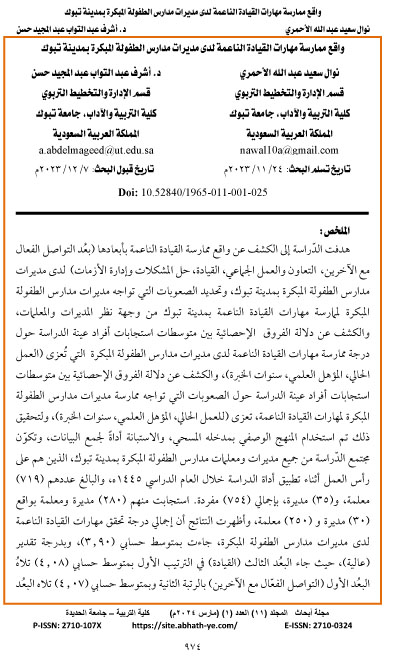The Reality of Practicing Soft Leadership Skills among Early Childhood School Principals in Tabuk City
Keywords:
Soft leadership skills, early childhood school principals, Tabuk cityAbstract
The study aimed to reveal the reality of soft leadership practice in its dimensions (effective communication with others, cooperation and teamwork, leadership, problem solving and crisis management) among early childhood school principals in the city of Tabuk, and to identify the difficulties that early childhood school principals face in practicing soft leadership skills in the city of Tabuk from the point of view of female principals and teachers, as well as revealing the significance of the statistical differences between the average responses of individuals in the sample of the study on the degree of practicing soft leadership skills among early childhood school principals, which is attributed to the following variables: (current work, academic qualification, years of experience), and revealing the significance of the differences in the statistics between the averages of the responses of members of the study sample regarding the difficulties faced by early childhood school principals in practicing soft leadership skills, which are attributed to the following variables: (current work, academic qualification, years of experience). To achieve this, the descriptive approach was used with its survey method, and a questionnaire was the tool for collecting data. The study population consists of all principals and teachers at early childhood schools in the city of Tabuk, who are at work during the application of the study tool during the academic year 1445 AH. They number (719) teachers and (35) principals, with a total of (754) individuals. (280) of them responded; they were (30) principals and (250) female teachers. The results showed that the total score for achieving soft leadership skills among early childhood school principals, from the point of view of female principals and teachers in early childhood schools in the city of Tabuk, came with an arithmetic average of (3.90), and a rating of (high). The third dimension (leadership) came in first place with a mean of (4.08), followed by the first dimension (effective communication with others) in second place with a mean of (4.07), followed by the second dimension (cooperation and teamwork) with a mean of (4.01), followed by the fourth dimension (problem solving and crisis management) ranking last with a mean of (3.47). It was also found that the degree of difficulties facing early childhood school principals in practicing soft leadership skills in the city of Tabuk was generally rated as medium, as the arithmetic mean reached (2.87). The study recommended the need for principals to reduce work pressures on teachers, by adhering to their quorum of daily quotas, giving an opportunity to appoint new teachers, and giving teachers the opportunity to participate in decision-making by holding a number of periodic meetings, whether weekly or bi-monthly, to determine the reality of the progress of the educational process and the practices that must be carried out to achieve the desired goals. Thus, there is a benefit from the experiences of teachers that they have acquired as a result of their presence in the field.

Downloads
Published
How to Cite
Issue
Section
License
Copyright (c) 2024 ِabhath Journal for the Humanities

This work is licensed under a Creative Commons Attribution 4.0 International License.
- البحوث المنشورة في المجلة مرخصة بموجب ترخيص (CC BY 4.0) Creative Commons Attribution 4.0 الدولي.
- تسمح المجلة بإعادة نسخ وتوزيع ونقل العمل لأي وسط أو شكل لأي غرض.
- تسمح بالتعديل والتحويل، والإضافة على العمل مع نسبة ذلك إلى المؤلف.
- حقوق النشر يحتفظ بها الباحثون.




